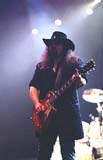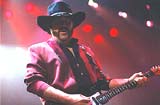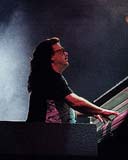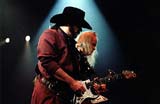
"In the beginning I was scared, but over the years
I've come to peace with it, and I think Ronnie's proud of what we're doing
today." Johnny Van Zant
 The
term "Southern Pride" takes on a whole new meaning when a town welcomes
the definitive southern rock of Lynyrd Skynyrd. Confederate
flags are everywhere and the capacity crowds are in "party til you puke"
mode, hours before the doors of the venues open. Everywhere the air
is infused with this southern pride, no matter where you are, and the desire
to R-O-C-K! Such is the legacy of a band most qualified to be called
"All-American." Don't call them a country The
term "Southern Pride" takes on a whole new meaning when a town welcomes
the definitive southern rock of Lynyrd Skynyrd. Confederate
flags are everywhere and the capacity crowds are in "party til you puke"
mode, hours before the doors of the venues open. Everywhere the air
is infused with this southern pride, no matter where you are, and the desire
to R-O-C-K! Such is the legacy of a band most qualified to be called
"All-American." Don't call them a country  band!
This is fist pumping, foot stomping, passionate rock and roll, then, now
and into the future. band!
This is fist pumping, foot stomping, passionate rock and roll, then, now
and into the future.
The story of Lynyrd
Skynyrd's rise, tragic fall and rebirth is known by most and is a true
testament to the core members, but their infusion of new blood several
years ago and their decision to stay true to their southern blues melodies
and blue-collar lyrics has kept them alive and kicking with a constantly
renewing fan base. Many have called them the Grateful Dead of the
south because of the cultish following they have had for over 20 years,
in some cases consisting of more than one generation in a family.
Their legacy lives on . . .
 In
The Beginning . . . In
The Beginning . . .
The core of the band,
Ronnie Van Zant (Vocals), Allen Collins (Guitar) and Gary Rossington (Guitar)
formed their first union in the late 60s, in a project called "My Backyard."
After just a short time, Leon Wilkeson showed up and assumed bass duties
and Billy Powell sat in on keys. The band's famous, perplexing name
was actually a back-handed salute to a tormenting gym teacher named Leonard
Skinner, who wasn't always  kind
to long-hair types. The name was morphed into Lynyrd Skynyrd, they
added drummer Bob Burns and set off to rock the south! kind
to long-hair types. The name was morphed into Lynyrd Skynyrd, they
added drummer Bob Burns and set off to rock the south!
Although they had
played together for several years, the band received its first record deal
in 1972, and set about making their debut album "Pronounced Leh-Nerd
Skin-Nerd" with their third guitarist, Ed King. This three guitar
crunch proved to be their signature sound and was never showcased any better
than in the unforgettable song "Free Bird." The song is still played
widely on radio, after a run that has lasted more than  25
years and is certain to be the finale at any Skynyrd concert you attend.
Between this hit and their opening band slot on the 1973 Who/Quadrophenia
tour, the dye for their destiny was cast. Another album, "Second
Helping," went multi-platinum in 1974, and another hit song (Sweet
Home Alabama) saw a personnel change with Bob Burns being replaced by Artimus
Pyle on the drums and Ed King bowing out by the end of that year.
Several more albums were to come before "Street Survivor," and the
tragedy that changed the course of their lives but couldn't 25
years and is certain to be the finale at any Skynyrd concert you attend.
Between this hit and their opening band slot on the 1973 Who/Quadrophenia
tour, the dye for their destiny was cast. Another album, "Second
Helping," went multi-platinum in 1974, and another hit song (Sweet
Home Alabama) saw a personnel change with Bob Burns being replaced by Artimus
Pyle on the drums and Ed King bowing out by the end of that year.
Several more albums were to come before "Street Survivor," and the
tragedy that changed the course of their lives but couldn't  dampen
their love for their music. dampen
their love for their music.
Lynyrd Skynyrd released
their sixth album, "Street Survivors," on October 17, 1977.
Three days later, the band was traveling between shows in Greenville, South
Carolina and Baton Rouge, Louisiana when their chartered plane crashed
near Gillsburg, Mississippi. The cause of the crash was speculated
to have been several things, including mechanical failure and running out
of fuel. No matter what the cause, three people died (vocalist Ronnie
Van Zant, guitarist Steve Gains and backing vocalist Cassie Gaines) and
the rest of the band was injured.
The band broke up
for ten years while wounds healed and members tried other things.
In 1980 Rossington and Collins formed a new band, which featured four of
the surviving members. Two years later, Pyle formed The Artimus Pyle
Band. Collins suffered a car crash in 1986, leaving him paralyzed
and he died four years later of respiratory failure. It wasn't until
1987 that Rossington, Powell, King and Wilkeson reunited Lynyrd  Skynyrd
and added Ronnie Van Zant's brother Johnny as their new vocalist and Randall
Hall on guitar. The similarities in the voices of Ronnie and Johnny
were almost a shock to die hard Skynyrd fans. "Originally,
we were just going to do one show," Johnny explains, "but then that became
a week's worth of dates, then a full-fledged tour and then, thanks to the
overwhelming support of old and new fans, the next thing I know, I'm in
the band full time." It's been an emotional experience for the talented
singer whose resemblance both vocally and visually to his older brother
is obvious. "In the beginning I was scared," Johnny admits, "but over the
years I've come to peace with it, and I think Ronnie's proud of what we're
doing today." Skynyrd
and added Ronnie Van Zant's brother Johnny as their new vocalist and Randall
Hall on guitar. The similarities in the voices of Ronnie and Johnny
were almost a shock to die hard Skynyrd fans. "Originally,
we were just going to do one show," Johnny explains, "but then that became
a week's worth of dates, then a full-fledged tour and then, thanks to the
overwhelming support of old and new fans, the next thing I know, I'm in
the band full time." It's been an emotional experience for the talented
singer whose resemblance both vocally and visually to his older brother
is obvious. "In the beginning I was scared," Johnny admits, "but over the
years I've come to peace with it, and I think Ronnie's proud of what we're
doing today."
What Are They
Up To Now?
 The
band's last full length studio album, "Edge of Forever," is harder hitting
than your average Skynyrd, especially in songs like "Preacher Man."
The sound is strong guitar rock that is masterfully decorated with the
passion and conviction of lyrics that each one of us can see ourselves
in, like looking in a mirror. It is perhaps their strongest
offering in their post tragedy era and leaves listeners with the unwavering
conviction that the south shall always rise again! The
band's last full length studio album, "Edge of Forever," is harder hitting
than your average Skynyrd, especially in songs like "Preacher Man."
The sound is strong guitar rock that is masterfully decorated with the
passion and conviction of lyrics that each one of us can see ourselves
in, like looking in a mirror. It is perhaps their strongest
offering in their post tragedy era and leaves listeners with the unwavering
conviction that the south shall always rise again!
Genre: Southern
Rock
Current Line-up:
Johnny
Van Zant - Vocals
Gary
Rossington, Rickey Medlocke, Hughie Thomasson -
Guitar
Leon
Wilkeson -
Bass
Michael
Cartellone -
Drums
Billy
Powell - Keyboards
Career Album
Discography:
Pronounced
Leh-Nerd Skin-Nerd (MCA) 1973
Smokes
(Sounds of the) 1973
Second
Helping (MCA) 1974
Nuthin'
Fancy (MCA) 1975
Gimme
Back My Bullets (MCA) 1976
One
More From The Road (MCA) 1976
Street
Survivors (MCA) 1977
Skynyrd's
First And . . . Last (MCA) 1978
Southern
By The Grace of God: Lynyrd Skynyrd Live (MCA) 1988
Lynyrd
Skynyrd 1991 (Atlantic) 1991
The
Last Rebel (Atlantic) 1993
Endangered
Species (Capricorn) 1994
Freebird:
The Movie (MCA) 1996
Southern
Nights (SPV) 1996
Sweet
Home Alabama (Ariola Express) 1997
Twenty
(CMC) 1997
What's
Your Name (MCA Special) 1997
Lyve/Live
(CMC) 1998
Edge
of Forever (CMC) 1999
Christmas
Time Again: King Biscuit Flower Hour Presents in Concert - Live (King
Biscuit) 2000
Career Turning
Point:
Lynyrd
Skynyrd released their sixth album, Street Survivors, on October
17, 1977. Three days after, the band was traveling between shows
in Greenville, South Carolina and Baton Rouge, Louisiana when their chartered
plane crashed near Gillsburg, Mississippi. The cause of the crash
was speculated to have been caused by several things, including mechanical
failure and running out of fuel. No matter what the cause, three
people died (vocalist Ronnie Van Zant, guitarist Steve Gains and backing
vocalist Cassie Gaines) and the rest of the band was injured.
The
cover of the Street Survivor album depicted the band surrounded
in flames, which was so upsetting to the surviving band members, it was
quickly changed by the record company. Perhaps because of this tragedy,
the album turned out to be one of the band's best sellers.
Visit
the official Lynyrd Skynyrd Web site
Purchase
Lynyrd Skynyrd music online at the iconoSTORE!
|

